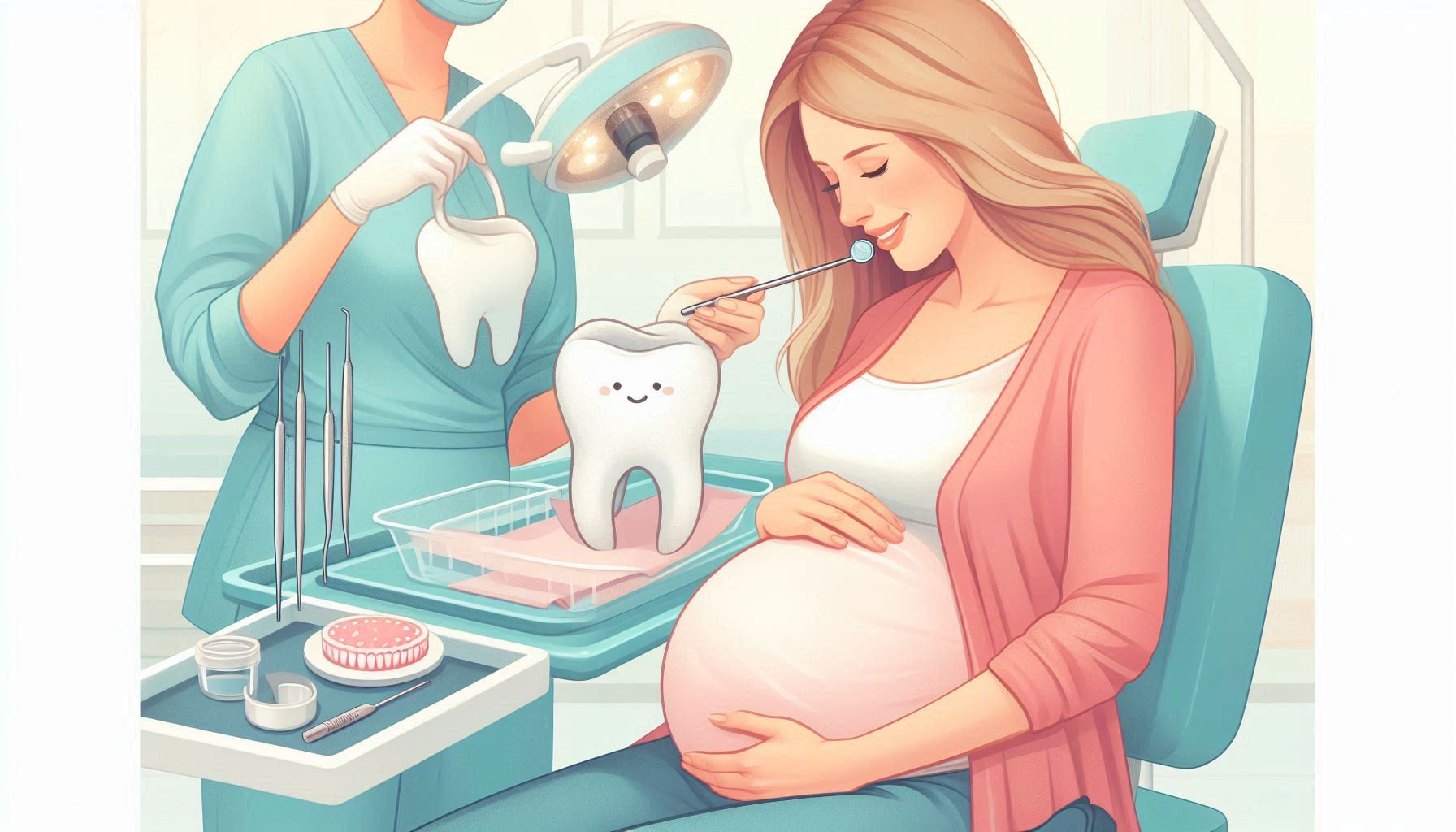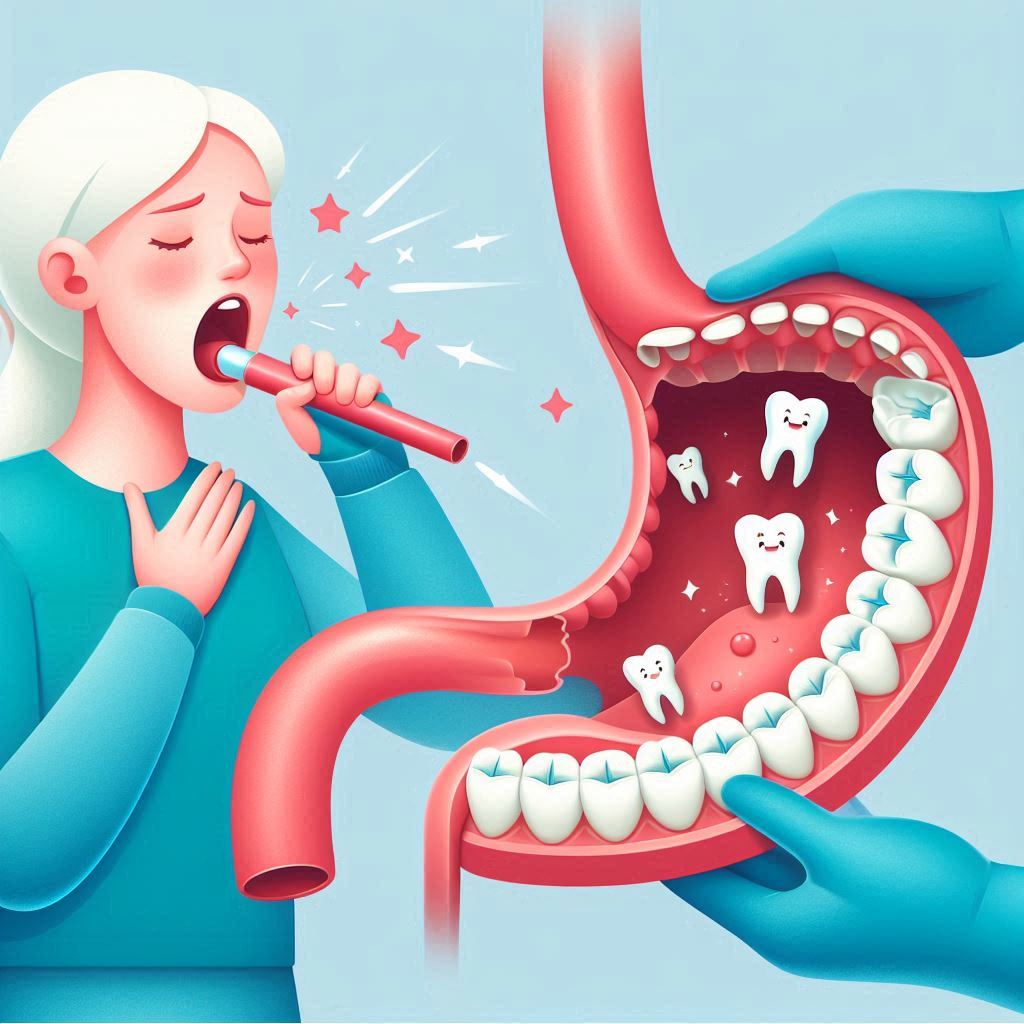Pregnancy brings about significant physical and emotional changes, with much focus on the health of the baby. However, the importance of maintaining the mother’s overall health, especially oral health, is often overlooked. Gum disease, or periodontal disease, is a common condition during pregnancy that can lead to serious complications if left untreated. Hormonal changes, such as increased levels of progesterone and estrogen, can make the gums more sensitive and susceptible to inflammation, resulting in pregnancy gingivitis or more severe forms of gum disease. Untreated gum disease can have profound effects on both the mother and the baby. Research has shown that gum disease during pregnancy is linked to an increased risk of preterm birth, low birth weight, and even gestational diabetes. The inflammation caused by gum disease may trigger premature labor or other adverse outcomes. Furthermore, the bacteria from infected gums can enter the bloodstream, potentially leading to systemic issues that impact the pregnancy.
To ensure a healthy pregnancy, it is essential to prioritize oral health. Regular brushing and flossing, maintaining a balanced diet, and visiting a dentist regularly for check-ups and cleanings are crucial steps. Addressing gum disease early on can help reduce the risk of complications, ensuring better health for both mother and baby. Understanding the link between oral health and pregnancy is key to promoting optimal outcomes for both.
Introduction: The Importance of Oral Health During Pregnancy
Oral health is a critical component of overall well-being, and it can have a significant impact on the health of a developing baby. Pregnancy introduces a variety of hormonal changes, many of which can affect oral health. During pregnancy, women are more likely to experience gum disease, often referred to as pregnancy gingivitis. If left untreated, gum disease can escalate to more severe conditions such as periodontitis, which can lead to complications such as preterm birth, low birth weight, and gestational diabetes.
While it is well-known that certain health conditions, such as high blood pressure or diabetes, can affect pregnancy outcomes, oral health and its connection to pregnancy complications are less frequently discussed. It is essential to recognize the potential risks posed by untreated oral infections and gum disease during this period.
Understanding Gum Disease: What It Is and How It Develops
Gum disease, or periodontal disease, is an infection of the gums and supporting structures of the teeth caused by the accumulation of plaque—a sticky, colorless film of bacteria that forms on the teeth. Plaque can harden into tartar (calculus) if not regularly removed through brushing and flossing. When plaque and tartar are not effectively removed, the bacteria begin to irritate and inflame the gums, leading to gingivitis, the early stage of gum disease. Gingivitis is characterized by redness, swelling, and bleeding of the gums, especially when brushing or flossing. At this stage, the infection is usually confined to the gums, and if caught early, it can be reversed with good oral hygiene practices.
However, if gingivitis is not addressed, it can progress to periodontitis, a more severe form of gum disease that affects the deeper structures of the teeth, including the bone. Periodontitis is characterized by gum recession, loose teeth, and even tooth loss. The bacteria in periodontitis can also enter the bloodstream, potentially affecting other parts of the body and leading to systemic inflammation. The causes of gum disease are multifactorial, but the most common contributing factor is poor oral hygiene. Other risk factors include smoking, poor nutrition, and certain underlying health conditions. During pregnancy, hormonal changes play a significant role in making women more vulnerable to gum disease.
How Pregnancy Affects Oral Health: Hormonal Changes and Their Impact
Pregnancy is marked by significant hormonal changes, especially an increase in the levels of hormones like progesterone and estrogen. These hormonal fluctuations can have several effects on the body, including the gums.
- Progesterone: This hormone plays a key role in maintaining pregnancy, but it also has a significant effect on the gums. Higher levels of progesterone increase the blood flow to the gums, which can cause them to become swollen, tender, and more prone to bleeding. Progesterone also increases the body’s sensitivity to the bacteria in plaque, making it easier for gum disease to develop.
- Estrogen: Like progesterone, estrogen levels rise during pregnancy, contributing to increased blood flow to the gums and tissues in the mouth. This heightened blood flow can make the gums more susceptible to infection and irritation, contributing to the development of gingivitis and periodontitis if plaque and tartar buildup are not controlled.
In addition to hormonal changes, pregnancy often leads to changes in oral hygiene habits. For some women, morning sickness and nausea can make brushing and flossing more difficult. Additionally, the cravings for sugary foods during pregnancy can increase the risk of plaque buildup and tooth decay, further compromising oral health.
Pregnancy Gingivitis: The Early Warning Signs of Gum Disease
Pregnancy gingivitis is a mild form of gum disease that affects many pregnant women, particularly during the second and third trimesters. This condition is typically marked by inflamed and swollen gums that bleed easily when brushing or flossing. The gums may appear red or purple, and there may be increased discomfort or sensitivity in the affected areas.
Some common signs and symptoms of pregnancy gingivitis include:
- Bleeding gums: Gums that bleed easily, especially when brushing or flossing, are one of the hallmark signs of pregnancy gingivitis.
- Swollen gums: The gums may appear puffier, swollen, or tender.
- Red or purple gums: Inflammation may cause the gums to appear red or purple instead of their usual pink color.
- Bad breath: The accumulation of plaque and bacteria can lead to persistent bad breath (halitosis).
- Sore or sensitive gums: Increased gum sensitivity can make brushing and flossing uncomfortable.
While pregnancy gingivitis is typically reversible with proper oral hygiene, it should not be ignored. If left untreated, it can progress to more severe forms of gum disease, including periodontitis.
The Risks of Gum Disease During Pregnancy: How It Can Affect You and Your Baby
Untreated gum disease during pregnancy can lead to a variety of serious health risks, not only for the mother but also for the developing baby. Emerging research suggests that the bacteria and inflammation associated with gum disease can affect the pregnancy in the following ways:
- Preterm Birth: One of the most concerning risks of untreated gum disease during pregnancy is an increased likelihood of preterm birth (birth before 37 weeks of gestation). Studies have shown that pregnant women with gum disease are more likely to experience premature labor, which can lead to premature delivery. The inflammation caused by gum disease can trigger the release of chemicals called prostaglandins, which can stimulate contractions and lead to preterm labor.
- Low Birth Weight: Gum disease is also linked to low birth weight (less than 5 pounds, 8 ounces). Babies born with low birth weight are at a higher risk of complications such as respiratory distress, developmental delays, and infections. Low birth weight is a significant factor in neonatal morbidity and mortality, making it a major concern for pregnant women with untreated gum disease.
- Gestational Diabetes: Some studies suggest a connection between gum disease and an increased risk of gestational diabetes. Gestational diabetes occurs during pregnancy and can lead to complications such as preeclampsia, fetal overgrowth, and preterm birth. Inflammation from gum disease may affect insulin regulation, contributing to the development of gestational diabetes.
- Preeclampsia: Preeclampsia is a condition characterized by high blood pressure and organ damage, which can occur during pregnancy. It is a serious complication that can affect both the mother and the baby. Research has shown that women with gum disease may be at a higher risk of developing preeclampsia, as inflammation from the gums may contribute to the development of this condition.
- Increased Risk of Infection: Bacteria associated with gum disease can enter the bloodstream through the gums and spread to other parts of the body, including the uterus. This increases the risk of infections that could harm both the mother and baby. Some studies have even suggested a link between gum disease and an increased risk of miscarriage.
The Impact of Gum Disease on the Baby: Beyond Prematurity and Low Birth Weight
The effects of gum disease during pregnancy are not limited to preterm birth and low birth weight. There is emerging evidence to suggest that the health of the mother’s oral cavity can affect the baby’s long-term health as well.
- Brain Development: Recent studies suggest that the inflammation caused by gum disease may have an impact on brain development in the baby. Inflammation can trigger the release of certain chemicals called cytokines, which may affect fetal development, including brain growth and cognitive function. The long-term effects of this potential impact are still being studied, but early findings suggest that oral health could play a role in the developmental health of the baby.
- Increased Risk of Childhood Infections: Infants born to mothers with gum disease may have an increased risk of infections during early childhood. This is due to the potential for bacterial transmission from the mother’s oral cavity to the baby during pregnancy or childbirth. Keeping gum disease under control can help reduce the risk of transmitting harmful bacteria to the baby.
Preventing and Managing Gum Disease During Pregnancy: Practical Tips
The good news is that gum disease can often be prevented or effectively managed during pregnancy with proper care. Here are several strategies that can help maintain optimal oral health during this crucial time:
- Maintain a Rigorous Oral Hygiene Routine: Regular brushing and flossing are the most effective ways to prevent gum disease. Pregnant women should brush their teeth at least twice a day with a fluoride toothpaste and floss daily to remove plaque and food particles that contribute to the formation of tartar and bacterial buildup.
- Use a Soft-Bristled Toothbrush: Pregnancy-induced gum sensitivity can make brushing uncomfortable. A soft-bristled toothbrush is gentler on the gums and can help reduce irritation and bleeding.
- Regular Dental Checkups and Cleanings: Visiting the dentist regularly during pregnancy is essential for preventing and managing gum disease. A dental professional can monitor the health of the gums, perform professional cleanings, and offer advice on managing oral health during pregnancy.
- Eat a Healthy, Balanced Diet: A nutritious diet rich in vitamins and minerals supports overall health, including oral health. Pregnant women should aim to eat plenty of fruits, vegetables, lean proteins, and whole grains. Avoiding excessive sugar intake is especially important to reduce the risk of plaque buildup and cavities.
- Stay Hydrated: Drinking plenty of water throughout the day helps maintain adequate saliva flow, which naturally protects the mouth from plaque buildup and dry mouth. Dry mouth is common during pregnancy and can increase the risk of tooth decay and gum disease.
- Rinse with Mouthwash: Using an antimicrobial mouthwash can help reduce plaque buildup and control bacteria in the mouth. Rinsing with water after vomiting or experiencing morning sickness can also help neutralize stomach acid and protect tooth enamel from erosion.
- Avoid Smoking and Alcohol :Both smoking and alcohol consumption are harmful to oral health and can exacerbate gum disease. Pregnant women should avoid these substances to protect both their health and the health of the baby.
Conclusion
Maintaining good oral health during pregnancy is essential for the well-being of both the mother and the baby. Gum disease is a common but preventable condition that can lead to serious complications, such as preterm birth, low birth weight, and other health risks. Pregnancy causes significant hormonal changes that increase the vulnerability of the gums to infection and inflammation, making gum disease more prevalent. However, with proper care and attention, the risks associated with oral health problems can be greatly reduced. A key step in preventing gum disease is maintaining a consistent and effective oral hygiene routine. Brushing teeth at least twice a day with fluoride toothpaste and flossing daily helps to remove plaque and prevent the buildup of harmful bacteria. Additionally, pregnant women should visit their dentist regularly for professional cleanings and check-ups. Dental professionals can monitor the health of the gums, identify any signs of gum disease early, and provide treatment before complications arise.
A balanced diet is another important factor in maintaining optimal oral health during pregnancy. A diet rich in vitamins, minerals, and nutrients supports healthy teeth and gums while helping to prevent issues like tooth decay and gum disease. Staying hydrated also plays a crucial role in keeping the mouth moist and preventing dry mouth, which can exacerbate oral health problems. Education is key to promoting the importance of oral care during pregnancy. By informing women about the potential risks of gum disease and the steps they can take to protect their oral health, we can ensure better outcomes for both the mother and baby. Prioritizing oral health throughout pregnancy is vital for promoting overall health and well-being.
SOURCES
Caffesse, R. G., Glickman, I., & Frisbee, C. (2004). Pregnancy and periodontal health: The role of gingivitis in adverse pregnancy outcomes. Journal of Periodontology, 75(11), 1514-1519.
Gajendra, S., Bhat, P., Kumar, N., & Sundaram, A. (2011). Maternal oral health and pregnancy outcomes: A review. Journal of Dental Health, 18(3), 207-211.
Gong, T., Tan, L., & Yang, X. (2012). Effects of maternal periodontal disease on the birth outcomes: A meta-analysis. Journal of Clinical Periodontology, 39(7), 630-639.
Lopez, N. J., Gonzalez, O., & Moreno, R. (2007). Periodontal disease and adverse pregnancy outcomes: Review of the literature. Obstetrics and Gynecology Clinics of North America, 34(4), 681-694.
Mirza, R., Nazir, M. A., Siddiqui, F., & Raza, S. A. (2015). Pregnancy and oral health: Exploring the link between oral hygiene and pregnancy outcomes. Journal of the Pakistan Medical Association, 65(6), 1-6.
Petti, S., Sartori, G., & Bianchi, A. (2014). Oral health and pregnancy outcomes: Evidence from a case-control study. International Journal of Women’s Health, 6, 577-584.
Xiong, X., Buekens, P., & Teixeira, J. (2006). Periodontal disease and adverse pregnancy outcomes: A review of the literature. Journal of Periodontal Research, 41(3), 176-182.
Yarborough, C. M., & Hyman, D. (2008). The link between periodontal disease and pregnancy: Implications for maternal and fetal health. American Journal of Obstetrics & Gynecology, 199(5), 490-497.
Zhang, L., Zhao, H., & Wang, X. (2010). Periodontal disease and pregnancy outcomes: A systematic review and meta-analysis. Journal of Clinical Periodontology, 37(4), 379-389.
HISTORY
Current Version
January 16, 2025
Written By:
SUMMIYAH MAHMOOD




